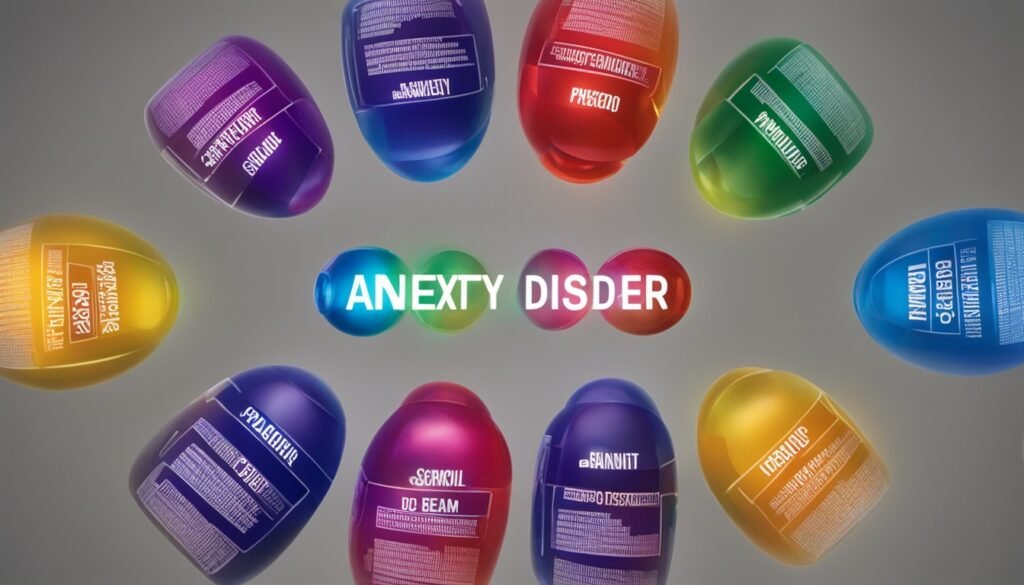Medical Treatments For Anxiety:- In this article, we will explore the latest advancements in medical treatments for anxiety. Discover the cutting-edge techniques and medications that can enhance your mental well-being, reduce anxiety symptoms, and bring peace to your daily life.
Key Takeaways: Medical Treatments For Anxiety
- Revolutionary medical treatments are available for anxiety, offering relief and improved quality of life.
- The understanding of various anxiety disorders and their symptoms is crucial in selecting the appropriate treatment approach.
- Psychotherapy, in combination with medication, plays a vital role in managing anxiety effectively.
- Different types of medications, including benzodiazepines and antidepressants, are commonly used for anxiety treatment.
- Specific anxiety disorders may require targeted treatment approaches based on individual needs.
Understanding Anxiety Disorders and Symptoms
Before delving into the medical treatments for anxiety, it is important to understand the different types of anxiety disorders and their symptoms. Anxiety disorders are more than just occasional worry or fear; they are persistent and can interfere with daily life. Let’s explore some of the most common anxiety disorders:
Generalized Anxiety Disorder (GAD)
Generalized anxiety disorder is characterized by excessive and uncontrollable worry about everyday situations and events. People with GAD often experience feelings of restlessness, irritability, and difficulty concentrating. Physical symptoms such as muscle tension, fatigue, and trouble sleeping may also be present.
Social Anxiety Disorder
Social anxiety disorder, also known as social phobia, involves an intense fear of social situations. People with this disorder may fear being judged or embarrassed by others, leading to avoidance of social interactions. Physical symptoms such as blushing, sweating, and trembling may occur when facing feared social situations.
Also Read: What Are the Environmental Impacts of Technology?
Panic Disorder
Panic disorder is characterized by recurring panic attacks. These attacks are sudden and intense episodes of fear and discomfort, accompanied by physical symptoms such as a racing heart, shortness of breath, and chest pain. People with panic disorder often live in fear of experiencing further panic attacks.
Obsessive-Compulsive Disorder (OCD)
Obsessive-compulsive disorder involves intrusive, unwanted thoughts (obsessions) and repetitive behaviors or rituals (compulsions). People with OCD may perform these rituals to alleviate anxiety or prevent a feared outcome. Common obsessions include concerns about cleanliness, orderliness, and safety.
Post-Traumatic Stress Disorder (PTSD)
Post-traumatic stress disorder can develop after experiencing or witnessing a traumatic event. Individuals with PTSD may experience intrusive memories, nightmares, and flashbacks related to the traumatic event. They may also avoid situations or triggers that remind them of the trauma.
These are just a few examples of anxiety disorders, and each disorder has its unique set of symptoms. It is important to remember that anxiety disorders are common and treatable. Seeking professional help is crucial for accurate diagnosis and treatment planning.
Also Read: Fueling Your Future: Exploring The Benefits Of Auto Finance
Now that we have an understanding of different anxiety disorders, let’s explore the common symptoms associated with these disorders:
- Excessive worry or fear
- Restlessness or irritability
- Trouble concentrating
- Muscle tension or aches
- Fatigue
- Trouble sleeping
- Panic attacks
- Intrusive thoughts
- Repetitive behaviors
- Flashbacks or nightmares
If you or someone you know is experiencing these symptoms, it may be a sign of an anxiety disorder. Seeking professional help is the first step towards understanding and managing anxiety.
Psychotherapy for Anxiety Treatment
As an essential component of anxiety treatment, psychotherapy offers individuals a range of effective therapeutic approaches to manage their anxiety. Two evidence-based psychological treatments, cognitive-behavioral therapy (CBT) and exposure therapy, have particularly shown promising results in alleviating anxiety symptoms.
Cognitive-behavioral therapy (CBT) focuses on identifying and challenging negative thought patterns and behaviors that contribute to anxiety. Through CBT, individuals learn new coping strategies and develop healthier thinking patterns, leading to a reduction in anxiety symptoms.
Exposure therapy involves gradually exposing individuals to their feared situations or objects in a controlled and supportive environment. This therapeutic approach helps individuals confront and overcome their fears, leading to reduced anxiety and increased confidence.
It is important to note that psychotherapy can be combined with medication to provide comprehensive treatment for anxiety disorders. This approach, known as combination therapy, is often recommended for individuals with severe symptoms or those who do not respond to either psychotherapy or medication alone. By integrating evidence-based pharmacological treatment and psychological therapy, individuals can experience improved outcomes in managing their anxiety.
Also Read: Unlock Your Financial Future with Personal Finance
The Benefits of Psychotherapy for Anxiety Treatment
The advantages of psychotherapy for anxiety treatment include:
- Provides individuals with effective coping strategies to manage anxiety symptoms in various situations.
- Addresses the root causes of anxiety and works towards long-term symptom relief.
- Empowers individuals to develop resilience and self-confidence in dealing with anxiety triggers.
- Enhances overall emotional well-being and improves quality of life.
“Psychotherapy has proven to be a valuable tool in helping individuals with anxiety overcome their fears and regain control of their lives.” – Dr. Nancy Johnson, Clinical Psychologist
Medications Used for Anxiety Treatment

When it comes to treating anxiety disorders, medications play a crucial role in providing relief and improving overall well-being. Various types of medications are used, including benzodiazepines, antidepressants, and selective serotonin reuptake inhibitors (SSRIs). These medications target different aspects of anxiety to help individuals manage their symptoms effectively.
Benzodiazepines
Benzodiazepines are a class of drugs commonly prescribed for anxiety disorders. They work by enhancing the effects of gamma-aminobutyric acid (GABA), a neurotransmitter that helps reduce brain activity. This results in a calming effect and helps relieve anxiety symptoms. Benzodiazepines are effective in providing short-term relief and are often used as a first-line treatment option for acute episodes of anxiety.
Also Read: How Can I Improve My Credit Score?
However, caution should be exercised when using benzodiazepines due to their potential for dependence and withdrawal symptoms. It is important to follow the prescribed dosage and consult with a healthcare professional to avoid any adverse effects.
Antidepressants
Antidepressants are another class of medications commonly used in the treatment of anxiety disorders. These medications work by affecting the balance of neurotransmitters in the brain, such as serotonin and norepinephrine, which are involved in regulating mood and emotions.
Selective serotonin reuptake inhibitors (SSRIs) are one type of antidepressant commonly prescribed for anxiety. They specifically target serotonin, a neurotransmitter associated with feelings of well-being and happiness. SSRIs are considered a first-line treatment for many anxiety disorders due to their effectiveness and relatively fewer side effects compared to other antidepressants.
Second-generation antidepressants, such as serotonin-norepinephrine reuptake inhibitors (SNRIs) and tricyclic antidepressants (TCAs), may also be prescribed in certain cases where SSRIs alone may not provide sufficient symptom relief.
Effectiveness and Considerations
Medication for anxiety disorders can be highly effective in reducing symptoms and improving quality of life. However, it is important to note that medication should always be used in combination with other treatments, such as psychotherapy, to achieve the best outcomes. Each individual’s response to medication may vary, and finding the right medication and dosage may involve some trial and error.
It’s essential to work closely with a healthcare professional who can monitor the effects of the medication and make any necessary adjustments. Regular follow-up appointments and open communication are vital for successful treatment.
While medications can provide significant relief, they may also have side effects. These can vary depending on the specific medication and individual response. Common side effects include drowsiness, nausea, dizziness, and sexual dysfunction. It is crucial to discuss any concerns or side effects with a healthcare provider for proper guidance and support.
Also Read: Cricket’s Global Appeals: Unveiling the Worldwide Craze
| Medication Type | Mechanism of Action | Common Side Effects |
|---|---|---|
| Benzodiazepines | Potentiates the effects of GABA, a neurotransmitter that reduces brain activity | Drowsiness, impaired coordination, dependence, withdrawal symptoms |
| Antidepressants (SSRIs) | Modulates serotonin levels in the brain to regulate mood and emotions | Nausea, sexual dysfunction, headache, nervousness |
| Second-generation antidepressants (SNRIs, TCAs) | Modulates serotonin and norepinephrine levels in the brain | Similar to SSRIs, plus potential additional side effects |
It is worth noting that medication alone cannot address the underlying causes of anxiety, and it is essential to combine it with therapy and lifestyle changes for long-term management. Combining medication with psychotherapy, such as cognitive-behavioral therapy (CBT), can provide a comprehensive approach to treating anxiety disorders.
“Medication can be an effective tool in managing anxiety, but it should be used as part of a larger treatment plan that includes therapy and self-care.”
Ultimately, the choice of medication depends on various factors, including the specific anxiety disorder, individual response, and considerations for potential side effects. Healthcare professionals work closely with individuals to determine the most suitable medication and dosage to achieve optimal results.
Targeted Treatments for Specific Anxiety Disorders

While anxiety disorders share common symptoms, each disorder often requires specific treatment approaches to address its unique challenges. Understanding the targeted treatments for separation anxiety disorder, social anxiety disorder, panic disorder, post-traumatic stress disorder, and obsessive-compulsive disorder can help individuals access the most effective interventions for their specific needs.
Treatment for Separation Anxiety Disorder
Separation anxiety disorder is commonly observed in children but can also affect adults. The primary treatment approach for separation anxiety disorder involves a combination of psychotherapy and medication. Psychotherapy techniques, such as cognitive-behavioral therapy (CBT) or play therapy, help individuals understand and manage their anxiety triggers, while medication, often selective serotonin reuptake inhibitors (SSRIs), can provide symptom relief.
Treatment for Social Anxiety Disorder
Social anxiety disorder, characterized by excessive fear of social interactions, responds well to a combination of therapy and medication. Cognitive-behavioral therapy (CBT), exposure therapy, and group therapy help individuals confront social situations and challenge negative thought patterns. Medications like selective serotonin reuptake inhibitors (SSRIs) or anti-anxiety medications may be prescribed to reduce anxiety symptoms.
Treatment for Panic Disorder
Panic disorder, with recurring panic attacks and intense fear, can be effectively treated through a combination of medication and psychotherapy. Antidepressant medications, such as selective serotonin reuptake inhibitors (SSRIs), and benzodiazepines may be prescribed to manage panic attacks. Cognitive-behavioral therapy (CBT) and exposure therapy can help individuals identify triggers and develop coping strategies to manage panic symptoms.
Treatment for Post-Traumatic Stress Disorder
Post-traumatic stress disorder (PTSD) occurs after a traumatic event and can manifest in various ways. Evidence-based treatments for PTSD include trauma-focused therapy, such as cognitive processing therapy (CPT) and eye movement desensitization and reprocessing (EMDR), which help individuals process traumatic experiences and alleviate symptoms. Medications, including selective serotonin reuptake inhibitors (SSRIs) and prazosin for nightmares, may also be used in conjunction with therapy.
Treatment for Obsessive-Compulsive Disorder
Obsessive-compulsive disorder (OCD) entails recurring, unwanted thoughts (obsessions) and repetitive behaviors (compulsions). Effective treatments for OCD involve a combination of medication and therapy. Selective serotonin reuptake inhibitors (SSRIs) and tricyclic antidepressants help reduce obsessive thoughts and compulsive behaviors. Cognitive-behavioral therapy (CBT) techniques, such as exposure and response prevention, assist individuals in recognizing and managing their obsessive-compulsive patterns.
Treatment for Generalized Anxiety Disorder in Adults
Generalized anxiety disorder (GAD) in adults often requires a comprehensive treatment plan that combines psychotherapy with medication. Cognitive-behavioral therapy (CBT) helps individuals identify and challenge anxious thoughts and develop coping strategies. Medications like selective serotonin reuptake inhibitors (SSRIs), serotonin-norepinephrine reuptake inhibitors (SNRIs), and benzodiazepines may be prescribed to alleviate anxiety symptoms.
Comparison of Targeted Treatments for Specific Anxiety Disorders
| Anxiety Disorder | Treatment Approach | Main Interventions |
|---|---|---|
| Separation Anxiety Disorder | Psychotherapy and Medication | Cognitive-behavioral therapy (CBT), play therapy, selective serotonin reuptake inhibitors (SSRIs) |
| Social Anxiety Disorder | Psychotherapy and Medication | Cognitive-behavioral therapy (CBT), exposure therapy, group therapy, selective serotonin reuptake inhibitors (SSRIs) |
| Panic Disorder | Psychotherapy and Medication | Cognitive-behavioral therapy (CBT), exposure therapy, selective serotonin reuptake inhibitors (SSRIs), benzodiazepines |
| Post-Traumatic Stress Disorder | Therapy and Medication | Cognitive processing therapy (CPT), eye movement desensitization and reprocessing (EMDR), selective serotonin reuptake inhibitors (SSRIs), prazosin (for nightmares) |
| Obsessive-Compulsive Disorder | Therapy and Medication | Cognitive-behavioral therapy (CBT), exposure and response prevention, selective serotonin reuptake inhibitors (SSRIs), tricyclic antidepressants |
| Generalized Anxiety Disorder in Adults | Psychotherapy and Medication | Cognitive-behavioral therapy (CBT), selective serotonin reuptake inhibitors (SSRIs), serotonin-norepinephrine reuptake inhibitors (SNRIs), benzodiazepines |
Combination Therapies for Anxiety Treatment

When it comes to the treatment of anxiety disorders, combining psychotherapy and medication can offer significant benefits. This holistic approach integrates both pharmacological and psychological treatments to alleviate symptoms and provide long-term relief for individuals suffering from anxiety.
Psychotherapy, also known as talk therapy, involves working with a qualified therapist to explore and address the root causes of anxiety. Through various techniques and interventions, psychotherapy aims to modify negative thought patterns, develop coping strategies, and improve overall emotional well-being.
Medications for anxiety disorders, such as benzodiazepines and selective serotonin reuptake inhibitors (SSRIs), can complement psychotherapy by reducing the severity of anxiety symptoms. These medications work by targeting the brain chemicals responsible for anxiety, helping individuals regain balance and stability.
Combining psychotherapy and medication can offer a multi-faceted treatment approach that addresses both the psychological and physiological aspects of anxiety. This synergy allows individuals to gain a deeper understanding of their anxiety while simultaneously managing symptoms effectively.
Research has shown that the combination of psychotherapy and medication yields better outcomes compared to either treatment alone. A study published in the Journal of Clinical Psychiatry found that individuals who received a combination of psychotherapy and medication experienced significant reductions in anxiety symptoms and had a higher likelihood of achieving remission.
“The integration of psychotherapy and medication provides a comprehensive treatment approach for anxiety disorders. By addressing both the psychological and neurochemical aspects of anxiety, we can optimize treatment outcomes and help individuals regain control of their lives.”
Furthermore, combination therapy allows for tailored treatment plans that can be adjusted based on the individual’s response to different interventions. A skilled healthcare provider can carefully assess the effectiveness of both psychotherapy and medication and make necessary adjustments to optimize treatment outcomes.
With combination therapies, individuals can benefit from the immediate relief that medication offers while simultaneously gaining long-term coping skills through psychotherapy. This comprehensive approach not only helps manage anxiety symptoms but also equips individuals with the tools to navigate future challenges more effectively.
The table below summarizes the key points to consider when integrating psychotherapy and medication for anxiety treatment:
| Benefits of Combination Therapies |
|---|
| Addresses both psychological and physiological aspects of anxiety |
| Provides immediate relief through medication |
| Develops coping skills and resilience through psychotherapy |
| Customizable treatment plans based on individual needs |
| Better treatment outcomes compared to monotherapy |
By integrating psychotherapy and medication, individuals can embark on a comprehensive journey towards healing and managing anxiety. This combined approach offers a powerful combination of immediate relief and long-term growth, ultimately helping individuals lead fulfilling and anxiety-free lives.
Natural Remedies and Holistic Approaches to Anxiety Management
In addition to exploring medical treatments for anxiety, there are various natural remedies and holistic approaches available that can assist in anxiety management.
One effective technique is the practice of deep breathing exercises. Deep breathing exercises involve taking slow, deliberate breaths, focusing on inhaling deeply through the nose and exhaling slowly through the mouth. By regulating our breath, we can activate the body’s natural relaxation response, reducing anxiety and promoting a sense of calmness.
Mindfulness meditation is another powerful tool in anxiety management. This practice involves intentionally focusing our attention on the present moment, without judgment. By training our minds to be fully present, we can cultivate a greater sense of awareness and acceptance, reducing anxiety and increasing overall well-being.
“The mind is like water. When it is calm, everything becomes clear.” – Gautama Buddha
Additionally, certain herbal supplements have been found to have anxiety-relieving properties. For example, studies suggest that chamomile may help reduce anxiety symptoms by promoting relaxation and improving sleep quality. Valerian root is another herbal remedy that has been traditionally used to ease anxiety and promote a sense of tranquility.
It is important to note that while natural remedies can be beneficial, they should complement, not replace, medical treatments and professional guidance. Always consult with a healthcare professional before incorporating any new supplements or treatments into your anxiety management plan.
Also Read:- Discover the Top Hospitals and Clinics in India for World-Class Healthcare
Alongside these specific techniques, adopting a holistic lifestyle can contribute to overall well-being and anxiety relief. This includes incorporating regular physical activity, nurturing healthy relationships, and prioritizing self-care activities that promote relaxation and stress reduction.
Key Takeaways:
- Deep breathing exercises and mindfulness meditation can play a significant role in anxiety management.
- Herbal supplements, such as chamomile and valerian root, may offer natural relief from anxiety symptoms.
- A holistic lifestyle that embraces physical activity, healthy relationships, and self-care can promote overall well-being and help alleviate anxiety.
Seeking Help and Developing a Treatment Plan for Anxiety

If you or someone you know is struggling with anxiety, it is important to seek treatment from a healthcare professional. Effective treatment begins with a proper diagnosis and the development of a tailored treatment plan based on individual needs. This article will guide you through the process of seeking help and understanding the course of treatment for anxiety disorders.
Diagnosis and Treatment
Diagnosing anxiety disorders involves a comprehensive assessment conducted by a qualified healthcare provider. This may include a physical examination, discussion of symptoms, and consideration of any underlying medical conditions. By seeking professional help, you can receive an accurate diagnosis, which is crucial for developing an effective treatment plan.
Once diagnosed, a treatment plan is created to address your specific needs. This plan takes into account factors such as the severity of your symptoms, medical history, and personal preferences. It may involve a combination of psychotherapy, medication, and lifestyle modifications.
Course of Treatment
The course of treatment for anxiety will vary depending on the individual. It is important to recognize that effective treatment usually takes time and dedication. While some individuals may experience relief within a few weeks or months of treatment, others may require long-term management to maintain their progress.
Throughout the treatment process, regular follow-up appointments will be scheduled to assess your progress, adjust medications if necessary, and provide ongoing support. Open communication with your healthcare provider is essential to ensure that your treatment plan remains effective and responsive to your needs.
Treatment of Generalized Anxiety Disorder
Generalized anxiety disorder (GAD) is one of the most common anxiety disorders. Treatment for GAD often involves a combination of therapy, medication, and self-help strategies.
Therapy: Psychotherapy, such as cognitive-behavioral therapy (CBT), is often recommended for individuals with GAD. CBT can help you identify and change negative thought patterns and develop effective coping skills.
Medication: Medications for GAD may include selective serotonin reuptake inhibitors (SSRIs), serotonin-norepinephrine reuptake inhibitors (SNRIs), or benzodiazepines. These medications can help reduce anxiety symptoms and promote overall well-being.
Lifestyle modifications: In conjunction with therapy and medication, lifestyle modifications can play a significant role in managing GAD. This may include practicing relaxation techniques, engaging in regular exercise, and adopting healthy lifestyle habits.
Self-help strategies: Self-help strategies such as stress management, mindfulness techniques, and support groups can complement professional treatment and provide additional support.
By seeking treatment, understanding the course of treatment, and committing to long-term management, individuals with anxiety disorders can find effective relief and regain control of their lives.
| Treatment Tips for Anxiety Management |
|---|
| 1. Seek professional help for an accurate diagnosis and personalized treatment plan. |
| 2. Be patient and committed – effective treatment often takes time and effort. |
| 3. Follow through with regular follow-up appointments and maintain open communication with your healthcare provider. |
| 4. Consider a combination of therapy, medication, and self-help strategies for comprehensive treatment. |
| 5. Establish healthy lifestyle habits, including regular exercise and stress management techniques. |
| 6. Engage in self-help strategies such as mindfulness and support groups to enhance treatment outcomes. |
Managing Anxiety in Everyday Life

Apart from medical treatments, there are practical steps you can take to manage anxiety in your daily life. By incorporating coping strategies and self-help tips, you can reduce anxiety and improve your overall well-being. Here are some effective techniques to help you navigate and cope with anxiety:
1. Practice Mindfulness
Managing anxiety begins with cultivating mindfulness. Take time each day to focus on the present moment and engage in activities that promote a sense of calm. Mindfulness techniques such as deep breathing exercises, meditation, and yoga can help you reduce stress and better manage anxiety symptoms.
2. Engage in Regular Exercise
Physical activity is not only beneficial for your physical health, but also for your mental well-being. Incorporating regular exercise into your routine can help manage anxiety by boosting your mood, reducing tension, and increasing endorphin levels. Whether it’s going for a jog, practicing yoga, or participating in team sports, find an activity that you enjoy and make it a priority.
3. Prioritize Self-Care
Self-care plays a crucial role in managing anxiety. Make time for activities that bring you joy and relaxation, such as reading a book, taking a bubble bath, or spending time with loved ones. Setting boundaries and saying no when needed is also important in maintaining your well-being and reducing anxiety.
“Taking care of yourself is not selfish. It’s essential for managing anxiety and nurturing your mental health.”
4. Develop Healthy Coping Mechanisms
Finding healthy ways to cope with anxiety is key to managing it effectively. Identify coping mechanisms that work for you, whether it’s practicing deep breathing exercises during moments of stress, journaling to release thoughts and emotions, or engaging in creative outlets like painting or playing an instrument. Experiment with different techniques until you find what resonates with you.
5. Establish a Support System
Surrounding yourself with a supportive network of friends and family is crucial for managing anxiety. Reach out to loved ones who understand and validate your experiences. Additionally, consider joining support groups, both online and offline, where you can connect with individuals who have similar challenges and learn from their coping strategies.
Remember, managing anxiety is a journey, and what works for one person may not work for another. It’s important to experiment with different coping strategies and incorporate them into your daily routine. By taking proactive steps, you can build resilience and lead a more balanced, anxiety-free life.
Conclusion
In conclusion, medical treatments for anxiety have significantly advanced, providing individuals with anxiety disorders a wide range of options to enhance their well-being. By gaining knowledge about the various types of anxiety disorders, seeking professional assistance, and exploring different treatment approaches, individuals can find relief from anxiety symptoms and experience a more serene and fulfilling life.
Understanding anxiety disorders is crucial as it allows individuals to recognize their symptoms and seek appropriate help. Whether it is generalized anxiety disorder, social anxiety disorder, panic disorder, obsessive-compulsive disorder, or post-traumatic stress disorder, each condition requires tailored treatment to effectively manage symptoms.
Medical interventions, such as psychotherapy and medication, play a vital role in anxiety treatment. Psychotherapy approaches like cognitive-behavioral therapy (CBT) and exposure therapy have demonstrated their effectiveness in reducing anxiety. Additionally, medications like benzodiazepines, selective serotonin reuptake inhibitors (SSRIs), and second-generation antidepressants are commonly prescribed to alleviate anxiety symptoms.
However, it is essential to remember that managing anxiety extends beyond medical treatments. Incorporating natural remedies and holistic approaches into daily routines, embracing coping strategies, and adopting a mindful lifestyle can further enhance anxiety management. By combining medical treatments with self-care practices, individuals with anxiety disorders can achieve long-term relief and improve their overall well-being.
FAQs
Q: What is the main focus of the article “The Science Of Serenity: Revolutionary Medical Treatments For Anxiety”?
A: The article delves into the latest developments in medical treatments for anxiety, including medication and psychotherapy.
Q: How common is the use of anxiety medication in treating anxiety disorders?
A: Anxiety medication is commonly prescribed to people with anxiety disorders to help manage their symptoms.
Q: What is the significance of psychotherapy in combination with medication for treating anxiety?
A: Psychotherapy and medication are often used together to provide a comprehensive approach to treating anxiety and depression.
Q: How do anxiety and depression often coexist in individuals?
A: Many people with anxiety also experience symptoms of depression, highlighting the overlap between these two conditions.
Q: Can you explain the role of second-generation antidepressants in treating anxiety disorders?
A: Second-generation antidepressants are commonly used to treat generalized anxiety disorder and can be effective in reducing anxiety symptoms.
Q: What are some common physical symptoms associated with anxiety?
A: Physical symptoms of anxiety can include increased heart rate, sweating, trembling, and shortness of breath.
Q: How can treatment help individuals suffering from anxiety or depression?
A: Treatment, including therapy and medication, can help reduce symptoms of anxiety and depression, improving overall quality of life.







